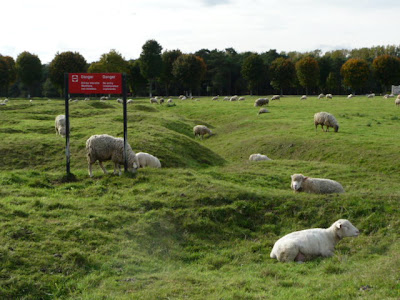In the United States it's marked by the half-hearted holiday Veterans Day, but here, it's a major holiday. Most stores and businesses are closed, the Metro is running on a holiday schedule and the streets are quiet.
It's more like Memorial Day than Veterans Day, and not just in the degree of holiday-taking. Because while people are treating it as a real holiday, there's little in the way of commemoration of the war.
I went to the Arc de Triomphe, site of France's Tomb of the Unknown Soldier, but saw very little out of the ordinary. There were flowers and wreaths on the tomb. There were people there, but not many more than on an average weekend day. There was silence. There were no public officials -- the president usually attends the ceremony here, but this year he elected to do it at the Verdun battlefield.
I was in London 20 years ago on Armistice Day and was struck by how many people were wearing red poppies on their lapel in commemoration of the Flanders battlefields, but I saw only a handful of those today. I'm not sure whether the tradition is dying out or whether it's mainly a British tradition -- the French army fought mainly to the south and east of the British, in areas that might not have had a huge poppy population.
World War I arguably was responsible for much of the tragedy of the 20th century: it directly led to the establishment of Communism in Russia and to Nazism in Germany (and thereby to World War II and the Cold War). It deserves to be remembered.
In a few places in northern France, the battlefields are preserved as monuments. I visited them earlier this fall. Here is a part of the Somme battlefield, where 19,000 British soldiers died in just one day of fighting, with trenches and shell holes still visible. The clump of people to the left of center is at the first British line; the other group, by the trees to the right, are at the German front line:

At Vimy Ridge, sheep mow the grass because unexploded shells in the mud make it too dangerous for humans to enter:

And finally, the Canadian war memorial at Vimy, overlooking the coal belt of northern France that remained in German hands throughout the war:

Happy Armistice Day, everyone.
2 comments:
Why do the Canadians call it Remembrance Day? (I guess they too were involved) It is important for this new war-free generation to understand the consequences of war, it should be taught to all and remembered, I so agree
Vimy Ridge, which is pictured, was the main Canadian battlefield of WWI. I'm not sure why they chose a different name for the holiday.
Post a Comment